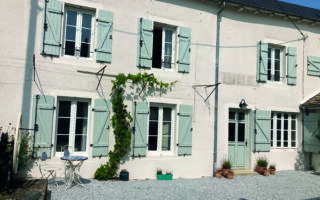Shared Ownership: How does fractional ownership work in France?

We like the idea of co-owning a property in France, it would make it more affordable, but unless you’re buying with friends/family, is it possible?
Some 25 years ago, I bought an old farmhouse in the rolling hills of the Dordogne. We realised this was a somewhat crazy idea as our family lived 3,000 miles away (on a 20-acre farm outside of Portland, Oregon) and also ran an investment business. But the lure of returning to our own old stone farmhouse, surrounded by sunflowers and vineyards, a place where our three youngsters could really benefit from their Portland French School studies… it was simply too appealing to ignore.
So, I set about creating the structure where a few families from our Pacific Northwest area could jointly own and use the property for a month or so, every year. Did we all know one another? No, but my husband and I reached out to a couple of clients who very quickly decided to pool resources with us and become co-owners. From there, Ron and Bernice had friends who wanted to learn more, as did Jeff and Marcy. We grew organically and quickly had a cohesive group of nine co-owners.
Since my first fractional ownership property in 1998, 1 have developed another seven co-ownership properties using the same principles: affordable elegance, shared expenses and responsibilities, all with the benefits of having a place you can really call home.
What sort of agreement would be in place between the owners?
Each International Property Shares fractional ownership property has its own operating agreement. This spells out the rights and responsibilities of the members/owners. An agreement typically includes definitions, members and membership interests, management, budgets and accounts, meetings, member use rights, accounting and records, transfer of interest, distributions, withdrawal and dissolution, indemnification and amendments.
What is the difference between fractionals and timeshares?
Ownership: The most fundamental difference is that the purchaser owns a percentage of the bricks and mortar with a fractional title – as opposed to renting the right to use a property with a timeshare. Unlike timeshares, with fractional ownership you can transfer or sell the ownership of your share. Holding market value: Fractionals tend to hold their market value or appreciate over time unlike timeshares, which don’t often hold their market value. Consider also, the expense of sales/marketing that goes into selling a vacation unit 52 times and which is then passed on to purchasers and not recovered.
Slower paced holidays: Slowing down allows us to immerse ourselves in the culture and ambience and truly enjoy our time at the deepest level. Why do you think fractional owners move at a slower pace? Because they can! Most IPS owners enjoy stays of four to eight weeks per year.
Annual maintenance and operation: Each fractional owner pays a portion of the annual running costs which range from around €730-€1,450 per year per owner. The dues cover the operational costs including taxes, insurance, utilities, phone, internet as well as a contingency fund. If you compare this to average annual fees for a time share week (€920), there is no comparison!
Ginny Blackwell, fractional ownership pioneer since 1988 at International Property Shares.
Looking for more like this?
French Property News is the go-to title for anyone considering a French property purchase, either now or in the future. Packed full of expert advice from property professionals including estate agents, lawyers and tax advisors, it is the ultimate househunter’s guide to the French property market.
Lead photo credit : Photo: Shutterstock
Share to: Facebook Twitter LinkedIn Email
More in french property, Shared ownership
Leave a reply
Your email address will not be published. Required fields are marked *




